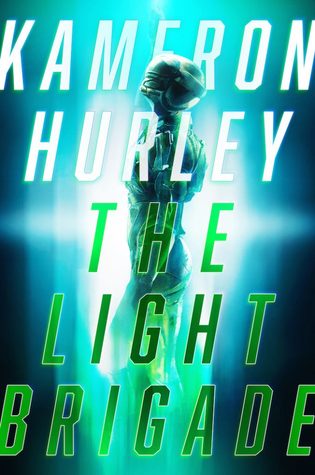Kameron Hurley starts 2019 off with a flash of light and a hell of a story. The Light Brigade, releasing March 19, pulls readers into a future where corporations run the world instead of traditional governments, and Mars is an active warzone. To fight against the Martians, soldiers are broken down into light, scattered into atoms and transported to the battlefield, where their powerful weapons and strict training take over. But when Dietz joins up and starts experiencing back drops that don’t match up with the rest of her field team, she begins to get a different picture of the war. One that doesn’t match what the corporations are telling them.
A page-turner if I’ve ever seen one, Hurley strikes gold with this one. With a classic yet stunning take on science, love, and loss, The Light Brigade will follow you across the galaxy, and hit you in the gut as many times as it pulls you back to your feet with a (mostly) friendly hand.

Dietz is a resident attached to a corporation when she signs up for the military. Fresh off heartbreak and angry at Mars, her journey through the pitfalls of war are harsh and stomach-churning. But her will does not break, even when she is fractured into light and smeared across an uncertain timeline that she has trouble keeping up with. This book is told semi-linearly—Dietz jumps through the timeline, but we stay with Dietz. This book marches towards its final encounters on a wobbly path, leaving readers in suspense and awe of Hurley’s casual trips through time.
The science in this book is just really freaking cool and slightly terrifying. There are unexplained mysteries, psych evaluations, and lots of future-tech. Soldiers are equipped with lenses that give them heads-up displays but that also record their every movement and conversation. Their powerful guns can blow enemies into chunks, and their body armor—appropriately called “slicks”—can take a bunch of hits. But even with this seemingly perfect technology, there are still mistakes.
Every time Hurley describes a drop, I was drawn in more and more. It was a fascinating interplay of science and fantasy—who doesn’t want to travel at the speed of light? Dietz’s own experience may vary from that of her fellow soldiers, but that just makes it even more fascinating—why is Dietz special? What makes her drops bad, what makes her travel into the uncertainty of war with an even more uncertain path?
There isn’t any overt discussion of any character’s sexuality, but it is refreshingly fluid and there are no awkward exchanges, just simple relief and easy relationships. Dietz’s ex-girlfriend is a major plot point, but not necessarily because of their relationship—more as motivation for moving forward, through the endless slog of violence and confusion. Other characters behave similarly; Dietz has sex with a man and a woman, neither of whom comment further than that. Everyone struggles with the loss that comes from war, and Dietz is almost suffocated by it, but their sexuality is never questioned, or interrogated. It simply is. There also isn’t a focus on gender—you don’t necessarily find out Dietz is a woman right away, and other characters are not defined by their secondary sex-characteristics unless they comment on it themselves.
If there’s anything wrong with this book, it’s that there should have been more. More of Dietz’s rough-around-the-edges personality, more drops, more character interactions. Dietz is a fascinating main character—brash, often unlikeable, with a backbone of metal. She struggles with her own perception of herself; when she’s out on the battlefield, confused from a bad drop or reeling from a fellow soldier’s death, it’s hard to think of her as a hero. But when it falls to her and her strange drops to attempt to fix this war? She might just be the villain she always feared.
Hurley lays out this novel with perfect pacing, lingering on scenes of horror and tranquility, and laying out the rare peaceful, boring days with a graceful touch. Dietz is a soldier, and her days are never predictable. Hurley juggles timelines and questionable ethics with ease, and it makes the entire novel an interesting journey. It’s a hard journey—we are constantly questioning Dietz’s perception of events, and the people around her. It’s hard to see the whole picture until the last ten pages, which then tie up the whole plot in a mind-bending, brilliant conclusion.
There are also tons of references sprinkled throughout the book, and I’m sure I didn’t catch them all. From the title itself (a reference to an ill-fated battle between British and Russian forces) to a few names, you’ll be finding a treasure trove’s worth of hints throughout.
Hurley originally wrote The Light Brigade as a short story on her Patreon page, and later expanded it into this novel. It looks like this is a stand-alone book, but it’s a fascinating universe that I hope Hurley returns to play in again one day.
CW: In this book, there are many depictions of violent deaths and of body horror. If you have a light stomach, be prepared. There’s lots of blood and other bodily fluids, and it’s not pretty.
Kameron Hurley
Publishes March 19, 2019







